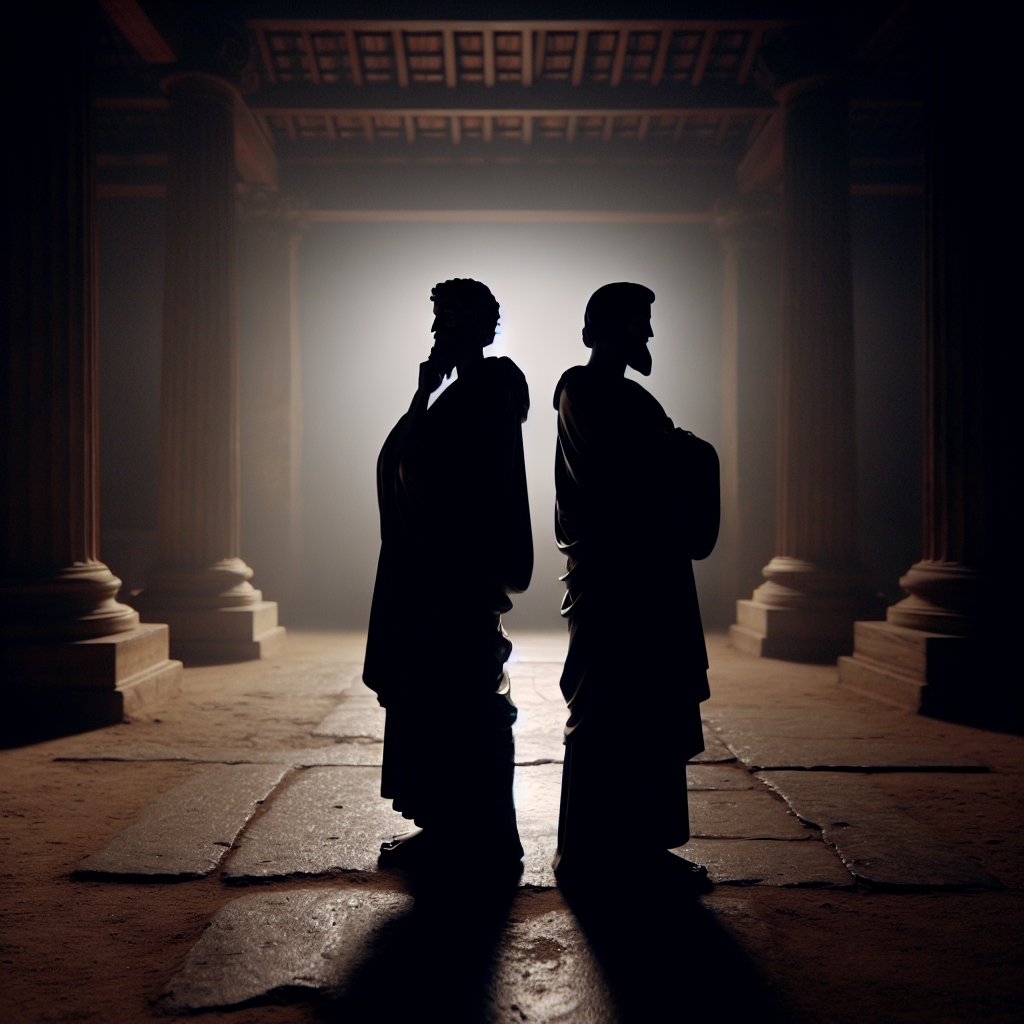A Quest for Divine Inspiration: The Báb and Bahá'u'lláh
Since the dawn of human history, a lineage of figures has emerged, claiming divine inspiration and delivering scriptures believed to originate from the very source of creation. The Bible, revered by Christians as divinely authored, stands as a testament to this phenomenon. Yet, a question has lingered within me: has the wellspring of divine inspiration ceased since its completion? Has anyone "written" down scripture since that they espouse was divinely authored? This inquiry led me through an unexpected passage to the Bahá'í Faith, where the figure of the Báb captured my attention – a prophet whose pronouncements, even from the mid-19th century, resonate with an undeniable power and, in my conviction, bear the hallmark of divine origin.
The Báb is the Herald, the Forerunner, Who hath come to prepare the way for the advent of the most great Light.–Shoghi Effendi, Guardian of the Baháʼí Faith
The Báb, whose very title signifies "the Gate," frequently alluded to a pivotal figure yet to appear: "Him Whom God shall make manifest." This future being, a Christ-like return in a new guise, was the central anticipation of the Báb's teachings, a beacon of hope illuminating his pronouncements. He unequivocally declared himself a mere forerunner, a herald preparing humanity for this momentous arrival. He is often thought of in terms of John the Baptist to this "Jesus" figure who will arrive in the future. As the Báb himself stated, “He Whom God shall make manifest is the Lord of all, visible and invisible, the Sovereign of all, the Adored One of all, in Whose hand is the dominion of all things.” This declaration underscores the immense stature of the future Manifestation he foretold.
The Báb's utterances constitute the initial cycle of that great prophetic movement, and His Revelation, though not attaining the full measure of the Baháʼí Revelation, should, nevertheless, be regarded as an independent Dispensation, divinely ordained, of unique potency and significance.
–H.M. Balyuzi, Eminent Baháʼí Scholar
For me, the Báb's words stand as the singular, authentic divine message for our era, a potent continuation of the prophetic tradition. I was overjoyed when I discovered the Báb's words! It was a soul-refresher, if ever there was one. I find myself believing that the world still awaits the promised "Him Whom God shall make manifest." Indeed, I suspect many Christians would find profound resonance in the Báb's teachings, which readily embrace and reconcile the foundational truths of both Christianity and Islam within a broader spiritual framework. As the Báb wrote, “The essence of all that We have revealed for thee is Justice, is for thee to be just; therewith to judge aright, and to be fair-minded.” This emphasis on justice echoes core ethical principles found in numerous faiths.
The Báb Himself bears witness to the greatness of this promised Revelation, and has clearly stated that His own Dispensation is but a prelude to that glorious Day.–Adib Taherzadeh, Baháʼí Historian
My journey through the landscape of religions has instilled in me a willingness to listen, to question, and even to concede if truth demands it. This personal quest for the underlying essence of all faiths has, in the case of the Bahá'í Faith, led me to what feels like solid ground, even if that assessment remains subjective and my quest has, for the most part, been a lonely investment of time into books that no longer see the light of day. It is, after all, a deeply personal exploration. I do not adhere strictly to any single religious institution, having found compelling reasons to embrace elements from many. I wouldn't push all my chips into the Religeous Casino, as it were, there are good odds to be had in many religions.
Baháʼu’lláh is the One promised by the Báb and all the Prophets of the past.–A central tenet of the Baháʼí Faith
Bahá'u'lláh, a contemporary of the Báb who appeared approximately two decades later in the same geographical region, claimed to be this very "Him Whom God shall make manifest." His followers regard him as the fulfillment of the Báb's prophecies, the divinely appointed One, but in fact, he is the one person who believed this, and espoused it. But the co-location of proximity to the Báb, and his timeline strike me as incredibly odd, if not awkward, for him to be who he claims to be. I find myself questioning the divine authenticity of Bahá'u'lláh's writings. It appears to me, perhaps subjectively, that the movement underwent a significant shift, with the focus increasingly centering on Bahá'u'lláh himself, potentially overshadowing the anticipated Manifestation heralded by the Báb. My limited experience within a local Bahá'í community reinforced this observation, with big Zoom meetings and discussions overwhelmingly focused on Bahá'u'lláh, often to the exclusion of the Báb's pivotal role. The Báb was not mentioned in the year of meetings I attended. Everything is Bahá'u'lláh. And subsequently it is his son, Abdu'l-Bahá, who fills a pivotal role in keeping his father heralded as the one who filled the prophecy.
The Revelation of Baháʼu’lláh is the culmination of a Divine process that has unfolded throughout history through the agency of the Messengers of God.–Another central tenet of the Baháʼí Faith
While acknowledging Bahá'u'lláh's often undeniable brilliance and the merit of many of his ideas, I struggle to recognize his writings as divine scripture in the same vein as the Báb's. To me, if the Báb's words shine, dripping with the brilliance of pure gold, then Bahá'u'lláh's, while perhaps valuable, possess a duller hue, lacking the unmistakable radiance of divinely inspired text. It has the properties of iron pyrite, Fool's Gold.
The Báb was the Morning Star of the Baháʼí Revelation, and Baháʼu’lláh the Sun.–A common Baháʼí analogy to describe their relationship
The world, in my view, was hijacked by Bahá'u'lláh, and remains in eager anticipation of the true "Him Whom God shall make manifest," the figure whose arrival was so powerfully foretold by the Báb. This anticipated advent, promising unity, peace, and divine guidance, has been the hope of centuries. I suspect that the prevailing understanding of Bahá'u'lláh's station might be a misinterpretation, even if his own belief in fulfilling the prophecy was sincere. It's easy to see how his delusion could have sustained his claims, but to think that this epic future figure would be someone from right around the same region and timing as the Báb, seems too much of a stretch. I cannot help but see the cracks in the claims of Bahá'u'lláh, but then again, I am a lone researcher looking to be inspired. While I drank in the 600,000 lines the Báb sculpted, when I bought Bahá'u'lláh's Gleanings, essentially his Greatest Hits, I skipped around the books looking for any hints of divine authorship like the Báb's, and I found nothing worth continuing, it wasn't enlightening or enjoyable. I could hardly find a reason for finishing it.
The Bábi Dispensation may be likened to the Baptist's, heralding the advent of the Christ.–A historical comparison often made within and outside the Baháʼí Faith
In conclusion, based on my personal exploration, the Báb stands as only compelling figure of divine inspiration within the Bahá'í Faith, and the world continues to await the promised Manifestation. If I had discovered Bahá'u'lláh's "inspired" writings first, I doubt I would have ever looked at the Bahai Faith any deeper. I certainly wouldn't have found his writings to have answered my question that led me there in the first place: has anyone else been divinely-inspired to write scripture in the last 2000 years?
The Baháʼí Faith sees Baháʼu’lláh as the return of Christ and all the other Messengers of God, fulfilling the prophecies of all religions.–The Baháʼí perspective on Baháʼu’lláh's station
And I would have thought the religion was, if not base-less, certainly without any respect for the pillars of foundation laid by the Báb and his believers (once called babis, who seem to have beenthwarted, or usurped, and gradually just identified as Bahá'ís).
The anticipation of this divine arrival of the messiah-figure deserves renewed emphasis, perhaps necessitating a fresh and unbiased examination of the Báb's profound writings – a vast and potent body of work that could inspire countless souls seeking truth and divine guidance beyond the familiar confines. While not advocating against reading Bahá'u'lláh, I believe his writings pale in comparison to the singular, irrefutably prescient pronouncements of the Báb. If I were to choose a religion, I would want to be a follower of the Báb, without any involvement from subsequent people. And we would still be in the era of the Báb with a destiny to be unveiled in the future.
Quotes from the Báb:
- "Verily, I say, unless all that is in the Bayán be literally fulfilled, and the one promised therein be made manifest, Our advent would have been in vain." (This quote emphasizes the paramount importance of the future Manifestation.)
- "O peoples of the earth! Give ear unto the Call of God, the Most Holy, the Most Great, the Well-Beloved. This is the Day whereon the testimony of God hath been established, and the argument of God hath been perfected, and the proof of God hath been manifested." (While this speaks to the Báb's own station, it also sets the stage for an even greater revelation to come.)
- "He is the one true God, exalted above all else, and His Messengers are but the manifestations of His glory." (This highlights the Báb's understanding of the prophetic tradition.)
- "The purpose of the creation of man and the revelation of all the Messengers of God hath been naught but the recognition of Him Who is the Bearer of the Trust of God in that Day, and His acceptance." (This underscores the central importance of recognizing the divine Manifestation in each age.)
Similar Quotes from Bahá'u'lláh:
- "This is the Day whereon mankind can behold the Face, and hear the Voice, of the Promised One." (Bahá'u'lláh directly claims to be the Promised One.)
- "Say, O peoples of the world! Know assuredly that My commandments are the lamps of My loving kindness among My servants, and the keys of My mercy for My creatures." (Bahá'u'lláh presents his teachings as divine commandments.)
- "God hath sent forth His Messengers unto His creatures in every age, and unto every dispensation, until He sent His last and most exalted Manifestation." (Bahá'u'lláh positions himself as this "last and most exalted Manifestation.")
- "The purpose of the one true God in revealing Himself unto mankind is to lay bare those gems that lie hidden within the mine of their true and inmost selves." (Bahá'u'lláh outlines the purpose of divine revelation.)
It is evident that while both sets of quotes speak to divine revelation and its purpose, Bahá'u'lláh's quotes directly assert his own station as the promised Manifestation foretold by previous prophets, including, in Bahá'í belief, the Báb himself. It is quite clear that the Báb is all about, "He" while Bahá'u'lláh is all about, "Me". The distinction in the nature of their claims is central to my personal conviction regarding their respective roles.
Wikipedia links:
Bahá'í Faith
Báb
Bahá'u'lláh


